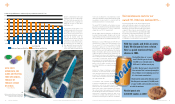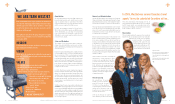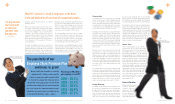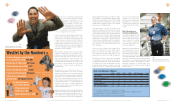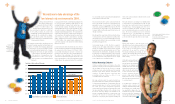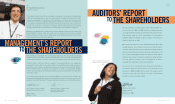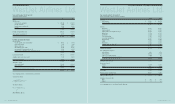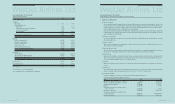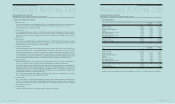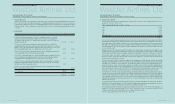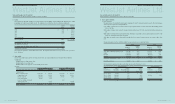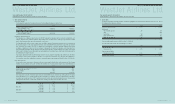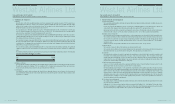Westjet 2003 Annual Report Download - page 18
Download and view the complete annual report
Please find page 18 of the 2003 Westjet annual report below. You can navigate through the pages in the report by either clicking on the pages listed below, or by using the keyword search tool below to find specific information within the annual report.
Kristie Silk, CSA,
Winnipeg: She used to
play ringette and
baseball. Her biggest
accomplishment is
working for WestJet.
John Bart, Business Analyst: He likes to salsa dance
and is a burgeoning jazz singer.
Shannon Lamb, Analyst: She likes African dance,
synchronized swimming and painting.
We have decreased the final
Ex-Im Bank commitment we
acquired in 2002 from US $478
million to US $450 million. Any
unutilized and uncancelled portion of the
final commitment is subject to a commitment
fee of 0.125% per annum. As a result of the
strengthening Canadian dollar during the year,
coupled with the commitment fee charged,
we cancelled the portion of the final Ex-Im
Bank commitment we reasonably believed the
Company would not draw on.
The Corporation has been able to benefit from low-cost
long-term financing supported by Ex-Im Bank loan
guarantees. To facilitate these financing arrangements
for our aircraft, we use two special purpose entities
that act as financial intermediaries for the Company.
Although we do not have an equity ownership
in these entities, we do primarily benefit from
their operations. Consequently, we have
included the accounts of the special-
purpose entities in our consolidated financial
statements.
when events and circumstances indicate that the assets
may be impaired.
We make estimates in accounting for our liability related
to certain types of non-refundable guest credits. We may
issue future travel credits related to guest compensation
for flight delays, missing baggage and other incon-
veniences as a gesture of good faith. These types of credits
are non-refundable and expire one year from the date of
issue. We record a liability based on the estimated
incremental cost of a one-way flight in the period the
credit is issued. The utilization of guest credits is recorded
as revenue when the guest has flown or upon expiry.
Outlook
WestJet will continue to meet the needs of all
stakeholders by actively seeking opportunities that
will allow us to successfully position ourselves to
be the leader in the high-efficiency, low-fare
environment. As we await the outcome of
Air Canada’s bankruptcy proceedings, we will
continue to proceed with caution and conservatism
during these uncertain times within the
airline industry.
2004 will be an important year for
WestJet, as it will be the first
year we welcome the transborder
market into our scheduled route
network, while at the same time
expanding the markets we serve
within Canada. We will continue
to strive to decrease unit costs,
increase operating efficiency,
provide a high quality differen-
tiated product at a low cost, and
deliver exceptional customer service
to our valued guests.
In our eight years of operation, the
Canadian airline industry has
undergone substantial changes. With
the challenges these changes bring,
new opportunities always arise. Our
motivated team of people is continually
poised to tackle these challenges to
seize the opportunities that our shifting
environment makes possible.
+
we successfully executed 12-year financing arrangements
at rates between 4.88% and 5.22%.
Since we have been able to achieve such low interest rate
terms on the majority of our debt, we consider that the most
appropriate measure of our leverage is the times interest
earned ratio, calculated as NIBIT/interest expense. At 2003
year-end, this ratio was strong at 4.91, demonstrating the
Company’s ability to sufficiently support its debt service cost
through its earnings.
We anticipate that current interest rate trends will continue
to decrease in the short-term and present us with positive
opportunities to lock in our remaining aircraft deliveries at
low interest rates similar to rates we are realizing on current
aircraft financing agreements.
Commencing January 1, 2004, WestJet is required to
formally assess all hedging relationships to determine
whether the hedging criteria required under Canadian
generally accepted accounting principles are met. These
criteria include the identification, designation and formal
documentation of hedging relationships, and assessment
of the effectiveness of the hedging relationship. WestJet
does not anticipate the new guideline to have an impact
on the Corporation’s accounting for hedges.
Critical Accounting Estimates
Critical accounting estimates are defined as those that
require the Company to make assumptions about matters
that are highly uncertain at the time the accounting
estimates are made, and potentially result in materially
different results under different assumptions and
conditions. For further discussion of these and other
accounting policies we follow, see Note 1 to our
consolidated financial statements.
We make estimates about the expected useful lives,
projected residual values and the potential for impairment
of our property and equipment. In estimating the lives and
expected residual values of our fleet of aircraft, WestJet
has relied upon annual independent appraisals,
recommendations from Boeing, and actual experience with
the same aircraft types. Revisions to the estimates for our
fleet can be caused by changes in the utilization of the
aircraft or changing market prices of used aircraft of the
same type. We evaluate our estimates and potential
impairment on all property and equipment annually and
Two-year charter agreement reached with Transat A.T. Inc. on August 20, 2003.
34 | 2003 WestJet Annual Report
+
In January 2004, WestJet secured financing arrangements
for US $358 million arranged by ING Capital LLC and
including ING Bank of Canada, Fortis Capital Corp., and
Sociéte Générale (Canada). This facility can be drawn in
Canadian dollars and fixed at a foreign exchange rate up to
six months in advance of delivery through the use of foreign
exchange forward fixing agreements. The Corporation has
vastly reduced its exposure to foreign currency fluctuations
on the purchases of Boeing Next-Generation aircraft since
debt to finance the aircraft is denominated in Canadian
dollars. Subsequent to year-end, the Corporation locked in
US $144 million at an average foreign exchange rate of
1.30 for the purchase of five aircraft to be delivered during
March to June 2004.
In 2002, WestJet locked in the interest rates on its first 15
purchased aircraft by entering into forward starting interest
rate agreements at rates between 5.25% and 5.85%,
successfully eliminating its exposure to interest rate
fluctuations on the financing of those aircraft during 2003.
We continue to take advantage of the low interest rate
environment in 2004 and locked in the interest rate on our
first five aircraft deliveries of 2004. By entering into forward
starting interest rate agreements under this new facility,
We continue to take advantage of the
low interest rate environment in 2004...
October 15, 2003: $144.0 million (net) share offering completed.
12 21 22201918
5.42% Average
17161514131211109876543
Fixed Interest Rates on Aircraft Financing
Aircraft Deliveries up to December 31, 2003 2004 Aircraft Deliveries
4.00%
4.25%
4.50%
4.75%
5.00%
5.25%
5.50%
5.75%
6.00%
2003 WestJet Annual Report |35







